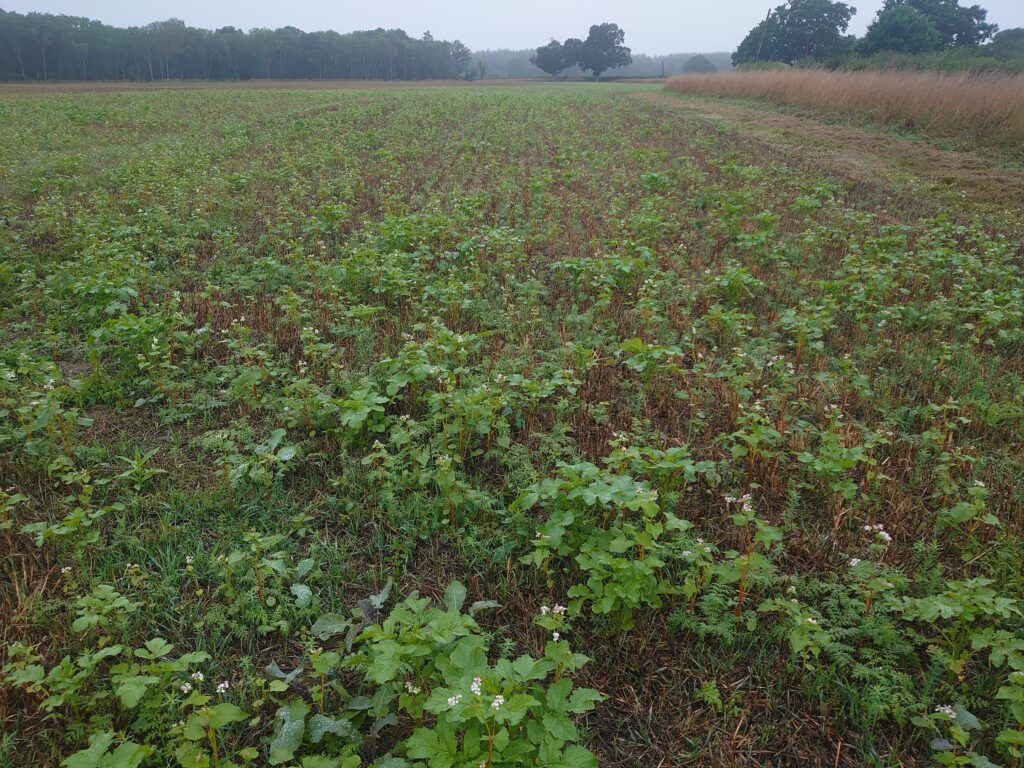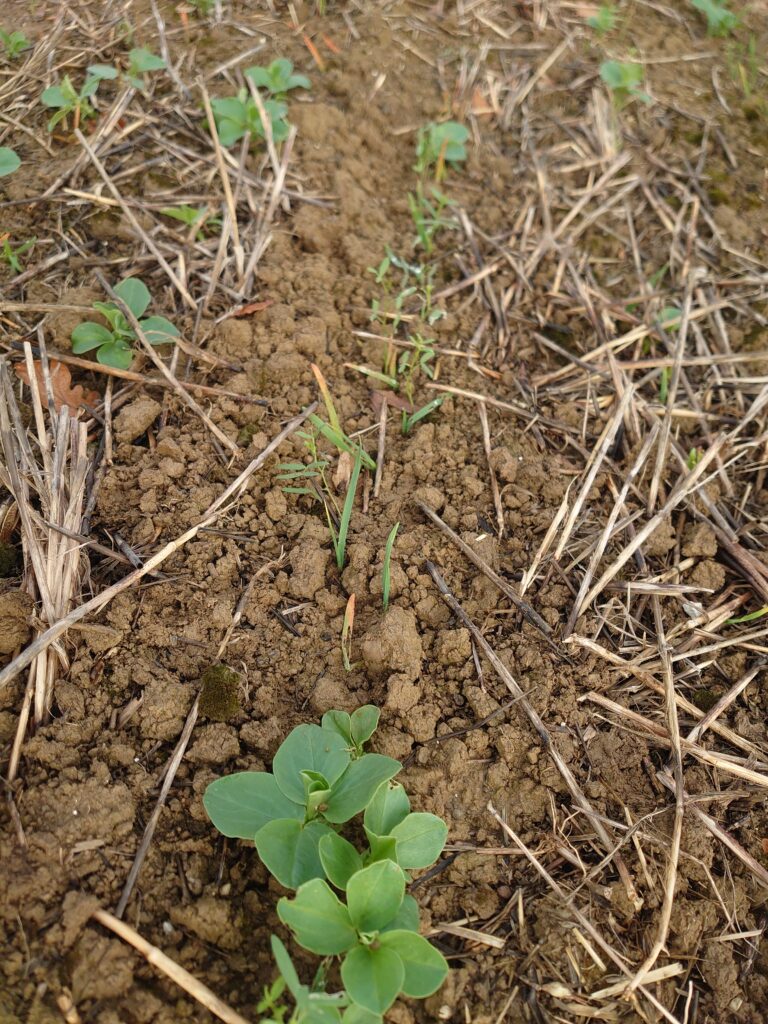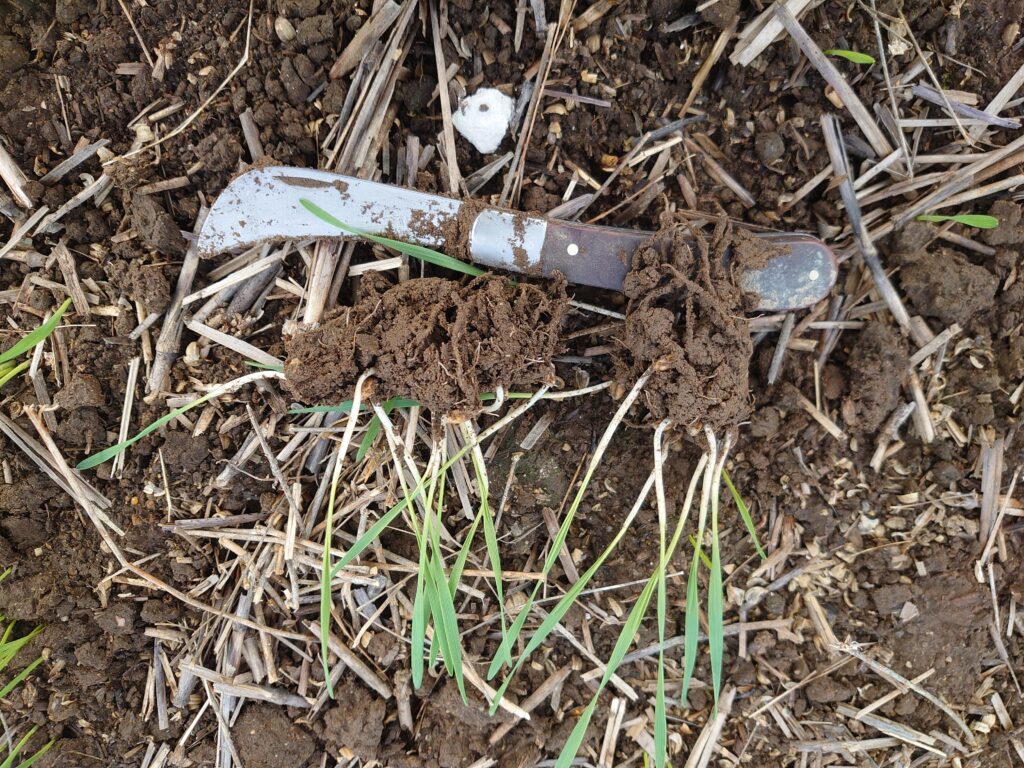Dec 2023
Like all farmers I am an eternal optimist and have decided to roll the dice again with another year of cropping. Things will be better next year? Hopefully! This autumn I think we have been lucky down in Kent. I didn’t start raining until the 12th of October and the soils were very dry and so have taken the rain well. Since then, we have had nearly 300mm of rain by the end of November, not ideal but the crops got established well and their heads above ground before the ground got too wet. We haven’t planted 10ha of Winter Beans, but these 2 fields can wait until the spring.
Our soils this year have not emerged from the latest wet year in good health. On the heaviest land, when I was going around with a spade after harvest the top 20cms had slumped. Roots were going through this layer, but I decided the soil needed some remedial action. I borrowed a neighbour’s LDS and subsoiled 90ha of our farm. After having done very little subsoiling in the past, I probably did more in 1 year than the previous 20. I do wonder with the weather patterns being more extreme and the rain being more intense that this may become more “normal”. We do have a couple of wheat fields that were herbage seed until harvest 2022 before going to winter beans, these fields are showing more yellowing than others and I think this could be due to the higher trafficking from the herbage seed leading to poorer soil structure, even though these fields yielded 5t/ha of winter beans.
Our cover crops look well, the cover crop species of the year seems to be linseed. Linseed seems to be the dominant species for some reason. One idea, I think is because slugs don’t particularly like eating it. The slug pressure seemed to be high in our cover crops this year and where the slug pelleter on the back of the drill stopped working for a few runs, linseed is about the only plant species to have survived. Anyone who tells me we should keep cover crop mixes simple and just plant a couple of species, I think are bonkers or don’t know what they are talking about! We seem to get a different stand every year even when planting a similar mix, a broad mix spreads your risk.

Recently in the farming press there was an article talking about how spraying silica onto the previous crop and then saving the seed reduces the slug grazing when the saved seed is planted. I think we have seen this in action as all our farm saved seed probably didn’t need any slug pellets, where we didn’t pellet the wheat, it looks as good as where we did. All our cover crop seed was bought in.
We tried to plant a lot of catch crops this summer but unfortunately our old Autocast system tried to set our combine alight. All the wiring melted but fortunately I saw the smoke and turned everything off pronto. There wasn’t time to fix it to make it safe so the rest of the catch crops didn’t get planted (see picture). I am coming to the conclusion that Autocasting is better than using an Outcast a few weeks before harvest. If there is enough moisture a few weeks before harvest, you really need to apply slug pellets with the seed, otherwise you just have to sit and watch them chew through the emerging crop. The problem with spreading pellets that near harvest, is that some may get stuck in the wheat ears and end up in the grain lump, so I avoid doing it. With Autocast you can spread with the seed or soon after harvest.
We have numerous trials going on this year. With Kings Crops we have planted plots for companion crops in Wheat and Beans with the SFI in mind. With Wheat we have planted Winter Vetch, Winter Peas, Avalon beans and a mixture of all 3. They all look well. With the Winter Beans we have planted Winter Oats and Winter Vetch (see picture). Even though the Propyzamide has knocked the oats they are still all there. The establishment of the companions this year gives me confidence to apply for SFI with the cover crop and companion crop options. Unfortunately, ATM the computer is saying NO! Any field with an option from our existing Mid-Tier scheme seems to upset the SFI algorithms.

This autumn we have planted a trial examining the effects of compost extract on the growth of wheat. Alongside Kent Wildlife Trust and Reading University we applied to The Co-Op for grant funding, and we were successful. The idea is to investigate over 2 season whether compost extract can help reduce the reliance on Nitrogen fertiliser. An initial check on the effect on rooting 10 days after planting seemed to show a marked difference (see pic – no extract left, extract right). A more in-depth check at the end of November seemed to show little difference, also plant establishment counts between the plots at a first look seemed to show little difference. My gut feeling is the extract will show positive effects in an adverse growing season, this autumn so far on this field has been fairly kind, what happens in the spring will be interesting.
Finally, we have been awarded follow-on funding for our N2 Vision Project that finished 18 months ago. Along with our project partners we will trial the robotic platform along with an algorithm for sensing Nitrogen content of wheat over the next growing season, to refine/develop the system to get it closer to a commercial reality. All in all, plenty to keep me busy over the next year!!


